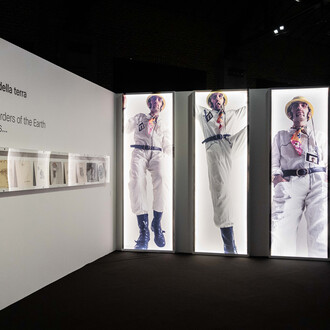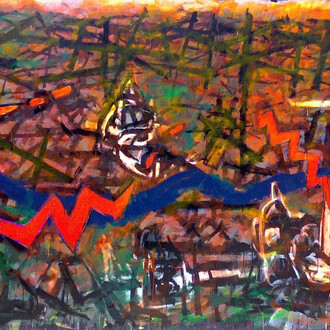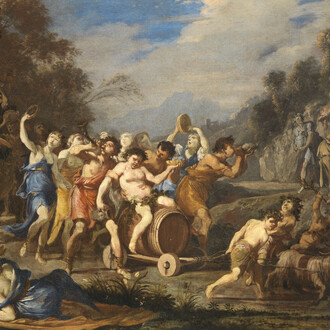This interview took place in two stages: initially, the questions addressed to Prof. Luisi, the founder of the "Cortona Week" Summer School since 1985, touched on his multifaceted career as a scientist, teacher, and writer, culminating in his response to the penultimate question, expressing the hope that the work of Cortona Week may continue in the future by expanding into new contexts the program of high human and ethical education courageously pursued thus far.
At the beginning of October, during the meeting organized by the Parliamentary Radio in the Senate of the Republic, the announcement was made that your wish has come true in favor of holding Cortona Week 2024 on the premises of the San Leonardo Fraternity, founded by Father Guidalberto Bormolini with the support of the Municipality of Prato. This is the happy twist of fate that I asked you about in our previous conversation. I thank you from the bottom of my heart on behalf of the entire group of Cortona Friends.
Allow me to go back to your memories as a child on your native island of Elba, to which you are much attached. Was your childhood peaceful and what role did the family play in your education and the direction of your studies?
It was a childhood characterized by poverty, which prevailed in the immediate post-war period. I was good at school, and my parents were proud of that and always pushed me harder, but I had no real contact with my parents, and in particular, I never felt real love for my mother. I admired my father, who was a factory worker, and we loved each other from afar, without any fuss. I often holed up in my parents' bedroom when they were away and wrote adventure stories in school notebooks, which I then hid in jealousy.
Your preeminent fields are chemistry and molecular biology. What prompted you to specialize in this vast field, and what were the stages of your journey as a scientist? Were there any decisive encounters that marked your research? Has your scientific career been linear or fraught with obstacles?
After high school, I earned a place at the Scuola Normale di Pisa, a public university in Pisa, where room and board were provided; otherwise, I wouldn't have been able to attend university. I won the science competition and had the option to choose between mathematical physics, geology, or chemistry. I chose chemistry somewhat randomly, even though the professors preferred me to pursue mathematics. I think what drew me to chemistry was my knowledge of alchemy, which was not so far from magic in the sense of transforming matter.
Throughout my academic journey, I always had the support of Professor Piero Pino, the director of the Institute of Chemistry. This continued during my studies in Zurich at the Swiss Federal Institute of Technology, where Professor Pino had been invited to relocate. Everything went smoothly, aside from a few bureaucratic difficulties of a Swiss nature.
Alongside your vocation and scientific achievements, you have cultivated literature, written novels, and crafted characters that inhabit your captivating stories of invention. Some, like "All'ombra dei fichi d'India," are set on the island of Elba. In others, such as "The Five Doors of Happiness" and "Quiet Flashes of the Mind," there emerges a soul attracted to the polarity of female eros and the spiritual quest, as if 'woman' and 'monk,' 'world' and 'cloister,' were beckoning you to pursue directions that may seem divergent. Is this the case? Did this dual calling foster the creatively mercurial openness that characterizes your experience as a man and scientist?
I have never felt pulled in multiple directions. When I had to write about Elba, I mostly did so in the summer, but I often became deeply engrossed in scientific problems, forgetting about writing for many months. Then the writing phase would return, and I would embrace it. My only source of distress was that my literary novels were not taken seriously by major publishers. I never had a mentor for my literary side. My first children's book was promptly accepted by Giunti, and that led me to mistakenly believe that writing and publishing novels was a straightforward matter. However, it never happened again that one of my literary works was accepted by a reputable publisher.
In addition to fiction, your interests have been diverse, ranging from the history of science and a concise history of antique collecting to the Eastern-Western art collection shared with Hong, your partner and painter. Your interests also encompass philosophies with a pronounced inclination towards Indian and Tibetan Buddhism. You have had encounters with various spiritual teachings and European and non-European meditation masters, including the 14th Dalai Lama, Tenzin Gyatso. Do you believe that the systemic and holistic perspective you have adopted can, in some way, align with the concept of an integral and inherently holistic reality in the Tibetan Bön tradition? Furthermore, do you think that potential integration with non-theistic Buddhist viewpoints could contribute to the development of a widespread form of universal religiosity in the 21st century, transcending the confessional boundaries that have been established over the millennia?
I believe so. Buddhism is, above all, a religion, and it would be incorrect to consider it solely as a philosophy. On the other hand, the Buddhist path is entirely rational, and one can extract valuable life lessons from it regardless of the ultimate goal. I have read extensively and engaged in numerous discussions about Buddhism, but I would not label myself as a Buddhist. A true Buddhist is someone who embarks on the journey with the intent of achieving the ultimate goal, which is liberation from ignorance. However, I genuinely believe that 'atheist' Buddhism, the kind that doesn't accept reincarnation, doesn't believe in ultimate satori, and naturally rejects the concept of a creator God, can indeed represent a form of universal religiosity.
As a member of the international research institute “Mind and Life,” you were invited years ago to give a two-week course on the origin of life in a Buddhist monastery in Bhutan. Could you share how the nuns reacted to teachings that were entirely foreign to their tradition and provide your personal insights on the experience? Furthermore, which principles of modern science have been observed to be in conflict with long-standing Buddhist beliefs concerning karma and human destiny?
My task was to convey the perspective of contemporary science within a course titled "From the Origins of Life to the Origins of Consciousness." We had disagreements on several matters, but especially when the concept of consciousness entered the discussion. They believed that there was no room for intentionality without consciousness. For instance, when I mentioned that an amoeba eats to follow its genetic code, they countered that if the amoeba eats, it possesses intentionality; it has consciousness. When I explained that intentionality resides in the mind of the investigator and is a projection, they didn't comprehend my point, and we ended the discussion with each of us holding our own view. There was a lack of consensus on some fundamental concepts such as consciousness, reincarnation, karma, and others. I learned a great deal from them, including how to doubt my own scientific assertions.
I'll share one detailed experience. My final lecture was dedicated to the concept of genetic conception. I presented and discussed the actions of the sperm and the ovum, followed by the genome, the development of the fetus, and the process of birth. The nuns were deeply moved, particularly when we reached the topic of birth, which evoked tears and expressions of joy. At the conclusion of the lecture, as I was packing my belongings, one of the nuns approached me and asked, "Professor, how is it that a baby is born?" For a moment, I thought I might have to reiterate the entire lesson, starting from chromosomes to the fetus. Then it dawned on me that this wasn't what she sought; she had grasped those scientific aspects. She was inquiring about the essence of life, not the specifics of sperm or chromosomes. I recall looking at her, and after some contemplation, perhaps speaking to myself, I replied, "Life is a mystery." She departed with a customary bow.
In the work "The Systems View of Life," co-authored by physicist Fritjof Capra (Cambridge University Press 2014, translated into Italian as "Aboca 2016"), you describe the emergence of systems thinking in contrast to the 'classical' mechanistic view, which you and Capra illustrate as having been transcended. You adopt the concept of self-organization (autopoiesis) in living systems as the foundational principle upon which explorations of 'mind and consciousness,' 'life, mind, and society,' 'science and spirituality,' and 'ecological sustainability and climate change' are built. You formulate ethical solutions that are appropriate for a global civil society. Do you perceive any additional factors that should be emphasized today regarding the complexity theory outlined in "Life and Nature"?
The book was written in the very early years of 2012–14, and since then many new and important things have happened in science and humanity—from climate problems to artificial intelligence, from cloning to the synthesis of cellular cyborgs. There are a number of new concepts that could be discussed in this regard. But what we tried to say in general in the 'old' book is still valid: awareness, being and remaining aware of the situation, and maintaining one's human dignity.
In the Emergence of Life. From Chemical Origins to Synthetic Biology (Cambridge University Press 2006–2016), you summon at one point (c. 6) a strange character called the Green Man, which sounds to me so much like the 'wild man' of the Alpine sagas of ancient memory. You imagine, however, that he is an intelligent creature from a distant solar system who descended down here to understand what life is on our planet. The 'green man' brings with him a list of terrestrial things that his sidereal principals want to know whether or not they are part of the regime of the living. He interrogates a simple farmer for the purpose, who surprisingly immediately distinguishes what is alive from what is not: e.g., a fly, a tree, a mule, a child, a mushroom, and a coral are on the first list, while a radio set, a car, a robot, a crystal, the moon, and a computer end up on the second list. On the basis of daily experience and what happens within himself, the farmer knows perfectly well that what is born, grows, regenerates, and decays by its own force from within has life, whereas a robot, a computer, a radio, or the moon do not have these resources and are therefore not alive and conscious! This very tasty dialogue between the Green Man who fell to earth and the farmer serves as a prologue to your learned explanations of the processes of autopoiesis, the term used by the theorists of the School of Santiago of Chile, Umberto Maturana and Francisco Varela, in dialogue with you in Chapter 8, where you have defined the self-organization of the living system and what follows from it. Your The Emergence of Life is not an easy book, and the steep questions that you go into with the help of specialists in the field, with the aid of diagrams, explanatory tables, appendices, and concluding notes in each chapter, altogether initiate even the unexperienced a glimpse of the difference between the notorious concept of knowledge, where there is a knower and a known in dualistic tension, and the quite different extended meaning of 'cognition', i.e., a process intrinsic to the living, from the simplest to the most complex, which overrides the old concepts of creator-creature. Can you briefly clarify what the autopoietic leap that overcomes the beliefs acquired, or rather 'tolerated' by the physical sciences to date consists of?
It should be noted that autopoiesis is not intended to be a theory after all, but a simple description of what the living cell does: it is mainly concerned with maintaining itself (self-maintenance) in spite of the thousands of reactions it carries out every second. In fact, all the reagents that are consumed in the reactions are regenerated by the system itself from within. Thus, the liver cell is always the liver cell. In this sense, life has not changed, and it still has. Life on this earth is cellular and only cellular, and will therefore always be autopoietic. There is no need for extensions. The question, if anything, is another: since autopoiesis is essentially chemical, does the argument that life is only chemical hold? Or does it take something else? Consciousness perhaps? Yes, but where does it come from? These are still open and fascinating questions.
In July 2023, at the Certosa di Pontignano (Congress Centre of the University of Siena), the work of the international summer school "Cortona week,", which you founded back in 1985 and which has continued almost uninterruptedly under your direction to the present day, took place. In the active presence of young researchers, scholarship holders, entrepreneurs, and managers, this year's central theme, science and the wholeness of life, was explored by dozens of experts in interdisciplinary fields, from physiology to medicine to psychiatry to astrophysics, to the 'new' theory of consciousness formulated by physicist and inventor Federico Faggin, to the pragmatic approach towards a widespread spirituality according to the monk and promoter of fraternity initiatives and support for the suffering Guidalberto Bormolini. Each one of them showed adherence in theory and in practice to the Cortona week propositional manifesto outlined in the school's program. What further directions and directives do you feel you can give for its fruitful continuation in the years to come?
I can only say that one Cortona week per year is too little for the world. We would need a hundred or a thousand of them—one in every university in the world—to make some possible change. Q. Following the meeting in the Parliamentary Radio organized by Cristina Del Tutto in the Senate Library in Rome on Tuesday, October 3, in the letter sent to members on October 6, you gave the good news that, thanks to the efforts of Father Guidalberto Bormolini, head of the San Leonardo Fraternity in Prato, the Municipality of this city has agreed to financially support the setting up of the Summer School on the premises of this community in the week of May 12 to 19, 2024. So your prediction of expanding the project by involving research groups in other venues has happily come true. What is your further comment on this providential news? A. Indeed, this practical success is one of the things I hoped for most. I am sincerely grateful to Father Bormolini and the Mayor of Prato, Matteo Biffoni, for this generous offer. Once we are free of the financial problem, we can turn our attention to the problem of extending the idea of a Cortona week to European and international contexts. Changing today's ugly world is difficult, but let us imagine a hundred or a thousand Cortona-Weeks happening every year, as mentioned above, involving the whole world. Then, perhaps, with a corresponding fresh wave of political and economic leaders in the world, something would change.




















